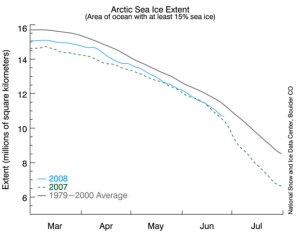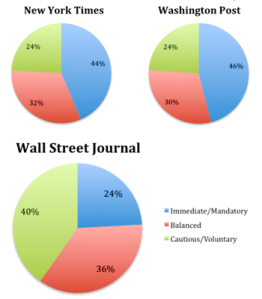Balancing Act April 14, 2009
Posted by Jamie Friedland in Climate Change, Media, Politics.Tags: Bias, Climate Change, George Will, Global Warming, Joe the Plumber, Journalism, Juliet Eilperin, Mary Beth Sheridan, Media Bias, New York Times, Opinion, Sea Ice, Sea Ice Loss, Wall Street Journal, Washington Post
trackback
In February, Washington Post columnist George Will wrote a piece entitled “Dark Green Doomsayers.” This column, joined by two others over the last three months, was littered with blatant mistruths and distortions about climate science. For example, Will claimed that a study said global sea ice levels hadn’t changed in 30 years when in reality it documented a loss of 520,000 square miles. Either painfully ignorant or deliberately deceitful, Will’s work has rightfully incited intense criticism of the Post.

- Arctic sea ice is retreating rapidly, and global levels have definitely decreased. Will claimed that no change had occurred while sea cover the combined areas of Texas, California, and Oklahoma disappeared. Credit: NSIDC
The paper has taken halfhearted steps to redeem itself. The Post’s ombudsman responded, but really just defended the paper and its editors. Then the Post ran two powerful letters to the editor debunking Will’s columns (one of them written by the Secretary General of the World Meteorological Organization (WMO), whose work Will also misused)…only to allow Will to misrepresent WMO data again in his third column!
Newspapers have a responsibility to provide accurate information to their readers. Permitting such thoroughly disproven material to be published, even in an opinion piece, undermines the journalistic integrity of the entire paper. And clearly others at the Post agree.
Because the editorial staff so clearly shirked their duty, serious journalists at the Post have stepped in. A week ago, Juliet Eilperin and Mary Beth Sheridan finally chastised Will – from the Post’s news section. Their article on sea ice decline included a paragraph that reads: “The new evidence…contradicts data cited in widely circulated reports by Washington Post columnist George F. Will.”
This is unprecedented. The task of fact-checking or retroactively correcting an errant columnist should fall to the editors or ombudsman, not to writers on page 3. And this incident skirts a journalistic issue of great importance to climate coverage in general: opinions in news.
News articles are supposed to contain facts, not opinion. In this case, Eilperin and Sheridan were justified because Will has been so verifiably and even quantifiably wrong in his recent columns that the existence of his errors is fact. But subtly opinionated news has plagued global warming coverage for years.
At the beginning of the year, I set out to examine the interaction between the media and the uninformed American public here on this blog. And as I wrap up this endeavor, I am also putting the finishing touches on an honors thesis investigating bias in the print coverage of climate change. To that end, I conducted a media analysis examining news stories (omitting editorial content) that mentioned global warming and how they portrayed the state of climate science.
I focused on measuring the “bias of balance,” which occurs when reporters artificially equalize two unequally supported, competing viewpoints (like climate scientists versus skeptics); essentially overzealous attempts at objectivity. But the most interesting results appeared when I separated my data by source.
The New York Times, Wall Street Journal and Washington Post are among the nation’s leading newspapers. And because writers for all three ostensibly strive for the same impartiality and cover the same set of climate-related events, one would think that their climate news coverage should be quite similar.

- In my data sample, coverage in the NYT and WP was nearly identical in tone. The WSJ was a whole different story.
And in the New York Times and Washington Post, it is. In the Wall Street Journal, however, articles are fully twice as likely to emphasize caution and voluntary programs to address climate change (rather than immediate, mandatory regulation). They’re also five times as likely to present with doubt the concretely established existence of anthropogenic (human-caused) warming. That’s just in news stories, not opinion columns or letters. This suggests that editorial voices can infiltrate into supposedly objective news articles to significantly influence coverage.
But even the most accurate climate coverage may be lost on many people. A recent Gallup survey showed that a record high 41% of Americans now think that news stories exaggerate the seriousness of climate change (3x more Republicans than Democrats). Yet the lessons of my thesis apply to threats that people actually comprehend and respect too.
According to Tom Rosenstiel and Bill Kovach, distinguished journalists now leading the Pew Project for Excellence in Journalism, “the primary purpose of the media is to provide citizens with the information they need to be free and self-governing.” And if that is true, today’s media are largely failing.
With pundits driving coverage and politicians’ sound-bites replacing expert analysis, real journalism is getting drowned out; we should be hearing from Joe the Economist, not Joe the Plumber. And the fact that you can turn on different “news” stations and see completely different views of the world is a shameful indictment of our overly politicized country.

- He may be thinking hard, but whatever comes out of his mouth will not better our country in any way.
The media have collectively settled on a misguided notion of balance and “fairness” as their single-minded priority for journalism. But what this country really needs right now is an emphasis on accuracy; viewers should not get to decide what facts are real. There is far too much at stake for such foolishness.
Opinion journalism has its place, and that’s not on the cover or under a breaking news headline. It’s at the back of the paper behind even the comics, opposite the editorial page where commentaries belong.
A version of this post ran in the Chronicle at Duke University.


Jamie – can you email me? Thx.
Excellent discussion. Thank you.
Did you pick up that Toles did a cartoon and that Robinson criticized the Post on Rachel Maddow? (http://getenergysmartnow.com/2009/04/09/washington-posts-willfully-civil-war/) FYI — from same post, Eilperin made a mistake in her article for which I could imagine Will demanding.
Or that Mufson walked away from this and that there was a strong editorial basically backing up Eilperin?
Finally, have you picked up how bloggers correct their mistake (in trusting Will / The Post on something), while the Post doesn’t seem ready to correct the slightest error? http://getenergysmartnow.com/2009/04/09/mea-culpa-i-trusted-george-will-and-washington-post-fact-checking/
[…] the rules. When ridiculous proposals and shameless hypocrisy earned them bad news coverage, they successfully demonized the “liberal media” and re-leveled the playing field. When the science of climate change became conclusive, they […]
[…] in Washington, DC, the front-line of a polarized America. And from the floor of the Senate to the op-ed page of the Washington Post, I am disgusted by the deliberate mistruths and toxicity that have polluted the national dialogue. […]
[…] in the interest of fairness and balance, the blighted dogma of modern journalism, allow me to present Landrieu’s […]
[…] is what is wrong with our country. I mean it. Public accountability no longer exists. It is not “gotcha” journalism to call out a public figure for a baseless lie or […]
[…] is its own form of bias. This was the subject of my honors thesis, which is summarized in my final column for the The Chronicle at Duke University. I can expound upon it if […]
[…] However, when the media provide 50-50 coverage to a situation where one party is clearly lying or wrong, that attempt at objectivity becomes what is called the “bias of balance,” about which I have blogged extensively and wrote my honors thesis. […]
[…] by presenting them on equal footing with actual facts. This is another manifestation of the “bias of balance” in modern media […]
[…] held our country hostage and prolonged American suffering in the process. Unfortunately, overly balanced media coverage combined with admittedly effective GOP spin (having your own network helps) enabled […]